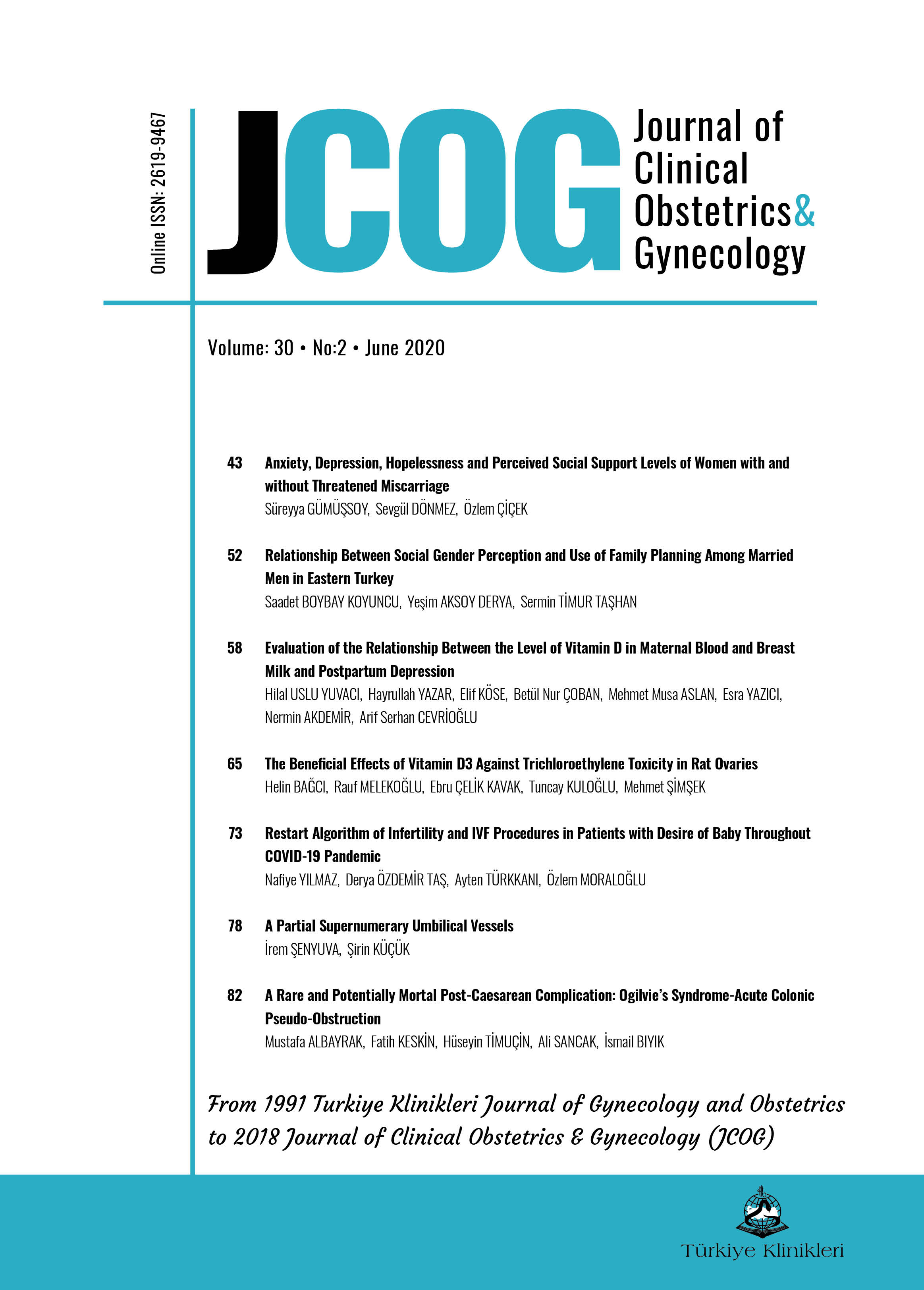Open Access
Peer Reviewed
REVIEW
3084 Viewed1431 Downloaded
Restart Algorithm of Infertility and IVF Procedures in Patients with Desire of Baby Throughout COVID-19 Pandemic
Received: 18 May 2020 | Accepted: 31 May 2020 | Available online: 11 Jun 2020
J Clin Obstet Gynecol. 2020;30(2):73-7
DOI: 10.5336/jcog.2020-76443
Article Language: EN
Article Language: EN
Copyright Ⓒ 2025 by Türkiye Klinikleri. This is an open access article under the CC BY-NC-ND license (http://creativecommons.org/licenses/by-nc-nd/4.0/)
ABSTRACT
COVID-19 infection, which was first detected in Wuhan region of China, spread rapidly in a short time, caused a very serious epidemic and was declared as a pandemic. This manuscript has been prepared as a recommendation for centers planning to restart assisted reproductive technology treatments to protect both patients and health personnel. To carry out the treatment, surgery and in vitro fertilization for patients who are infertile and are willing to have a child should not be victims of time loss during the COVID-19 pandemic. Patients before or after infertility treatment are evaluated by healthcare personnel using personal protective equipment in the triage section for the symptoms and risk factors defined in the COVID-19 Infection Guideline of the Ministry of Health. Body fluids (blood, follicular fluid, semen, etc.) of the patients should be considered as potentially infectious. Samples from patients infected with COVID-19 are recommended to be used in the same way as tissues from patients who are seropositive for other infectious diseases (HIV, Hepatitis). Infertility treatment and IVF procedures should be evaluated multidisciplinary and managed according to the COVID-19 guidelines in patients with infertility especially in poor ovarian reserve, severe male factor infertility, advanced age and also urgent fertility preservation condition.
COVID-19 infection, which was first detected in Wuhan region of China, spread rapidly in a short time, caused a very serious epidemic and was declared as a pandemic. This manuscript has been prepared as a recommendation for centers planning to restart assisted reproductive technology treatments to protect both patients and health personnel. To carry out the treatment, surgery and in vitro fertilization for patients who are infertile and are willing to have a child should not be victims of time loss during the COVID-19 pandemic. Patients before or after infertility treatment are evaluated by healthcare personnel using personal protective equipment in the triage section for the symptoms and risk factors defined in the COVID-19 Infection Guideline of the Ministry of Health. Body fluids (blood, follicular fluid, semen, etc.) of the patients should be considered as potentially infectious. Samples from patients infected with COVID-19 are recommended to be used in the same way as tissues from patients who are seropositive for other infectious diseases (HIV, Hepatitis). Infertility treatment and IVF procedures should be evaluated multidisciplinary and managed according to the COVID-19 guidelines in patients with infertility especially in poor ovarian reserve, severe male factor infertility, advanced age and also urgent fertility preservation condition.
REFERENCES:
- WHO. WHO Director-General's opening remarks at the media briefing on COVID-19 -29 June. 2020. https://www.who.int/dg/speeches/detail/who-director-general-s-opening-remarks-at-the-media-briefing-on-covid-19---29-june-2020
- The National Institutes of Health. Coronavirus disease 2019 (COVID-19) treatment guidelines. 2020. https://www.covid19treatmentguidelines.nih.gov/
- T.C. Sağlık Bakanlığı Halk Sağlığı Genel Müdürlüğü. [COVID-19 (SARS-CoV-2 Infection) Guide]. 2020. https://hsgm.saglik.gov.tr/depo/birimler/goc_sagligi/covid19/rehber/COVID-19_Rehberi20200414_eng_v4_002_14.05.2020.pdf
- ASRM. American Society for Reproductive Medicine (ASRM) Patient Management and Clinical Recommendations During the Coronavirus (COVID-19) Pandemic. Update #3 (April 24, 2020 through May 11, 2020) https://www.asrm.org/globalassets/asrm/asrm-content/news-and-publications/covid-19/covidtaskforceupdate3.pdf
- ESHRE COVID-19 Working Group. ESHRE Guidance on Recommencing ART Treatments. 2020. Date of publication: April 4. Last update: May 5. Published on the ESHRE website.
- ESHRE Guideline Group on Good Practice in IVF Labs, De los Santos MJ, Apter S, Coticchio G, Debrock S, Lundin K, et al. Revised guidelines for good practice in IVF laboratories (2015). Hum Reprod. 2016;31(4):685-6. [Crossref] [PubMed]
MENU
POPULAR ARTICLES
MOST DOWNLOADED ARTICLES





This journal is licensed under a Creative Commons Attribution-NonCommercial-NoDerivatives 4.0 International License.










